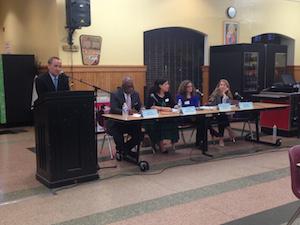College Admission: the Myth, the Hype, and the Reality
- Thursday, 21 May 2015 12:15
- Last Updated: Thursday, 21 May 2015 12:15
- Published: Thursday, 21 May 2015 12:15
- Caroline Kristof
- Hits: 9089
 SHS Juniors and their parents gathered anxiously in the school auditorium on Thursday May 14 to hear a panel discussion with college admissions officers who offered advice on the process of selecting schools and getting into college. The College Admissions Presentation, hosted by the SHS Counseling Department and the PTA, featured a panel of nine college admission officers who each provided insight into the college process and told the group what their particular schools look for in prospective students.
SHS Juniors and their parents gathered anxiously in the school auditorium on Thursday May 14 to hear a panel discussion with college admissions officers who offered advice on the process of selecting schools and getting into college. The College Admissions Presentation, hosted by the SHS Counseling Department and the PTA, featured a panel of nine college admission officers who each provided insight into the college process and told the group what their particular schools look for in prospective students.
Is it better to take the SAT or the ACT? Is it better to get a B in a top math class or an A in a second-tier class? Is it useful to join many clubs to demonstrate diverse interests, or to focus on grades instead? How much do legacy or connections help?
Those were the kinds of questions that parents and students raised—sometimes delicately—and that the college representatives addressed.
For the record, most colleges don't care whether students take the SAT or ACT. And this may not be helpful but the answer to the second question is: it's better to get an A—in the top math class. As for clubs, admissions officers advised students to find a balance between earning top grades and participating in extracurricular activities. Legacy and connections may help, but perhaps less than many believe.
The panel included Kathleen Torrey of Alfred University, Craig Broccoli of Binghamton University, Emily Lake representing Boston University, Peter Johnson of Columbia, Catherine McDonald Davenport representing Dickinson College, Jeanne Holzmann of Fordham University, April Hadnot of the University of Texas at Austin, Jan Deike representing Vanderbilt University, and finally JC Tesone of Vassar College.
The program began in the auditorium where the representatives each  introduced themselves and the schools they represent. Shortly after, the auditorium was split into two smaller groups; half went into the cafeteria with five of the representatives and the other half stayed in the auditorium with the other four representatives. The college admissions officers then went on to explain further about what students should do to prepare to apply to college and answered questions from students.
introduced themselves and the schools they represent. Shortly after, the auditorium was split into two smaller groups; half went into the cafeteria with five of the representatives and the other half stayed in the auditorium with the other four representatives. The college admissions officers then went on to explain further about what students should do to prepare to apply to college and answered questions from students.
Scarsdale High School's deans believe that this college admissions presentation is essential in helping students understand the college process. "I think a college presentation like this is important because...there are many truths and many rumors floating around out there and I think it is helpful to hear directly from the college representatives," said Dean Matthew Sweeney. Others said that end of junior year is the right time for students to begin focusing on college advice, because by now the students have a sense of their SAT scores and grades.
"Gathering more accurate information from a variety of different colleges is only a good thing," commented Dean Michael Hiller. "On the panel there's a large public school, there's a small private school, there's an Ivy League school, and it's just a great opportunity to hear from a cross section of schools about the admissions process and how they make their decisions."
The deans hoped that students walked away from the presentation much more knowledgeable and confident about the college process. "I hope students take away that this is not a mysterious or insane process," stated Dean Sweeney. "I also hope students gain an understanding that this is a human process. Real people are reading their applications--maybe even the same people who were speaking on the panel."
Dean Hiller added, "My hope is that the presentation helped students gain a little more of an understanding of the different pieces to the process--the college essay, the importance of senior year courses, and things that are still under the control of juniors at this point," he said.
Students agreed that hearing from admission counselors was beneficial. "It was cool to meet the actual people who are behind the process and as students we have to learn more about how the process works for specific colleges," said SHS junior Ali Bauersfeld. "I learned that even though there are distinct differences between each school, primarily the schools are looking for each student to do their best and show who they are in their applications...hearing from the counselors themselves goes beyond what a parent or friend can tell you."
However, despite all the information and comfort that the presentation provided, the upcoming months will still be stressful for the students. "I'm most nervous for the atmosphere and hype surrounding the college process," said Hayden Carey, a junior at SHS. "I feel that it will be impossible to avoid comparing yourself to others. Society, especially Scarsdale, puts so much weight on your college education that it is easy to get sucked in." Another SHS junior, Macie Wasserberger, is nervous about "falling in love with a school that I can't or won't get into."
Junior year and the first semester of senior year may feel like a Sisyphean task, yet students have suggestion about how to decrease the stress. Many juniors, including Wasserberger, believe that it would help for parents and teachers alike to not talk about college 24/7, as right now "it's all you hear about, which makes it even more stressful," she commented. Meanwhile, whenever Carey is feeling stressed he remembers what his brother always tells him: "It's just college." He thinks it's "always reassuring to hear that, that college isn't everything." Other students realize that "every year students go through the same process and deans, teachers, and parents are all amazing supporters," noted Bauersfeld.
Dean Sweeney advised students to "be organized and start applications in the summer, because starting early and being on top of things can be invaluable." He wants students to understand that "while the process can be stressful, it will work out in the end." Dean Hiller said, "try to really be reflective about who they are as learners and what they want to get out of their college experience, so that the schools they will ultimately apply to mesh with who they are and the goals they have." He also hopes that students "take the college process as a time to learn about themselves and to think about themselves in ways they hadn't before...they should just be honest with themselves and their parents so they find the right fit and have the potential of thriving both emotionally and academically to get the best out of their college experience."







